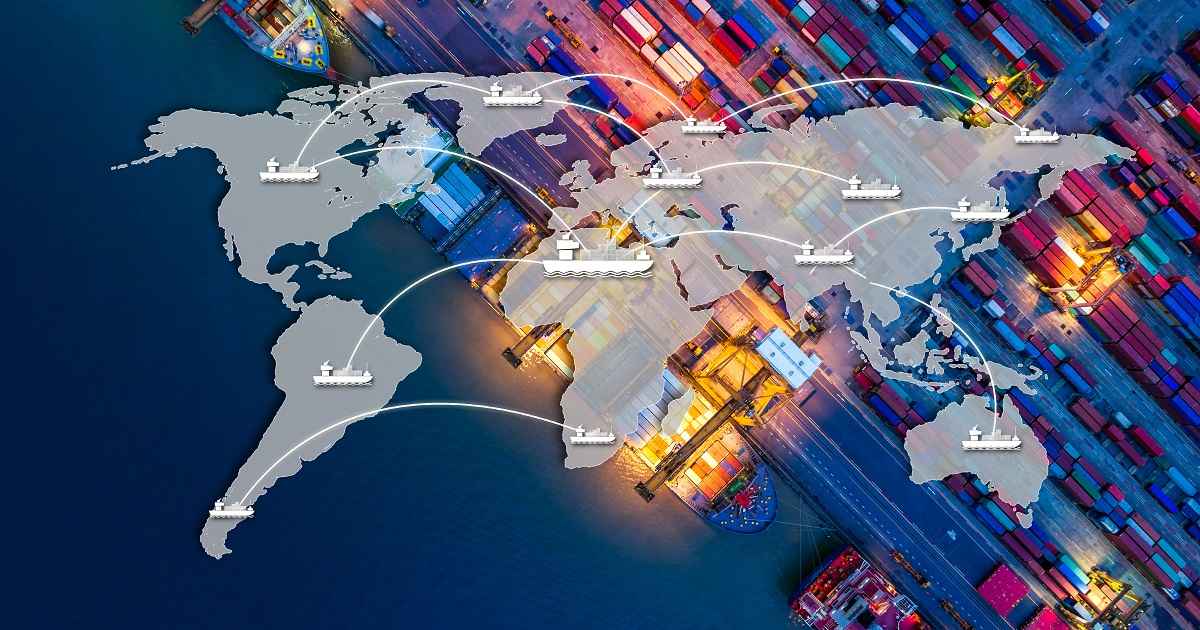
Warehousing and Distribution
Article | July 17, 2023
Introduction
From warehouse robots to delivery drones, the supply chain is experiencing a tremendous upheaval. AI promises a totally autonomous and self-organized future supply chain. A fleet of vehicles utilizing a swarm algorithm can enhance cargo yard throughput; a trusted peer-to-peer ledger on blockchain architecture could change compliance in the sector; and wearables, mobile robotics, and machine learning technologies could speed up order fulfilment. IOT e-brokerage solutions can link shops to couriers and transporters with a click. Tomorrow's supply chain will be leaner, quicker, and self-organized. A few innovative technologies will fuel this unparalleled rate of change over the next 15 years. Here are the major technologies that are shaping the future of the logistics industry.
Logistics Technologies for the Future
Shipment Tracking Systems
Previously, customers ordered shipments, had an anticipated arrival date, and then were kept in the dark until they chose to call. Customers can now access shipping and tracking systems around-the-clock due to developments in the internet and software. This not only enhances the customer experience (cx), but it also saves the business time and money.
Internet of Things (IoT)
The IoT reduces costs and delays by minimizing hazards in the supply chain. Cabs, cargo ships, trains, etc., have sensors that link to an alarm system or dispatcher. These sensors analyze and communicate information to the crew, who learns about hidden threats. IoT isn't a new technology, but it continues to influence logistics by improving in-transit visibility and delivery.
Radio Frequency Identification (RFID)
RFID technology has been used for a few years to monitor inventories labor-efficiently. A product tag or sensor produces radio waves. The company processes the data. RFID tags are similar to barcodes, but their faster information transport and data processing appeal to companies and the direction of technology. Many organizations use RFID tags to track containers in warehouses.
Enhanced GPS Accuracy
Almost everyone utilizes GPS on their vehicles or smartphones. These devices' accuracy has improved over time, assisting lost drivers and enhancing the supply chain. By monitoring truck locations and boosting hauls with current traffic data, GPS increases efficiency and customer satisfaction.
Closing Lines
Unprecedented times have produced unprecedented transformations that will last for generations. Changing demographics, technology improvements, and COVID-19 impacts are altering global supply networks. We must understand the driving factors and act on what we learn to adapt and rise to the situation. For the sake of our current workforce and future generations.
Read More

Warehousing and Distribution
Article | July 11, 2023
Explore the techniques to improve warehousing and distribution centre. Learn from the best books of logistics and distribution management and enhance warehousing operations and distribution processes.
Efficient warehouse management is crucial in the complex world of distribution and logistics. With various warehouse types serving different purposes, warehouse managers are responsible for ensuring smooth operations, safeguarding valuable goods, and optimizing supply chain units. Building a strong knowledge base is key, and the best way to start is by delving into the top warehouse management books. This article presents a curated list of essential reads that will provide you with a solid foundation in the warehouse and distribution field. From understanding fundamentals to exploring cutting-edge practices, these books help in better decision-making regarding warehousing and distribution operations.
1. Fundamentals of Warehousing & Distribution
Author Name: Material Handling Industry
Fundamentals of Warehousing & Distribution is an essential book for professionals in the warehousing and distribution industry. Published as part of the MHI Career & Technical Education Program, this series of four warehouse management books provides comprehensive knowledge on material handling equipment, information technology tools, and warehouse operations. Volume 1 serves as a foundational guide, introducing readers to modern warehouses and distribution centers' equipment, processes, and operations. With its focus on practical knowledge and industry best practices, this warehouse and distribution book provides readers with the skills and expertise necessary for successful warehouse and distribution management.
2. Warehousing and Distribution Practices
Author Name: xu ji ying
Divided into two parts, Warehousing and Distribution Practices covers seven key areas of the real-world processes for managing storage and implementation of effective distribution strategies. This distribution management book focus on essential knowledge and skills, each section provides valuable insights through logistics standard terms, case studies, knowledge links, and practical application. As one of the best books on logistics and distribution management, it will give you the complete step-by-step guidance to expand and improve warehousing and distribution centre by leveraging the theory shared by xu ji ying.
3. Warehousing And Distribution Management Project Type Tutorial
Author Name: Wang Yu
Warehousing and Distribution Management Project Type Tutorial, a logistics and supply chain management book, revolutionize logistics education with its innovative approach. This comprehensive book goes beyond traditional teaching methods, immersing readers in real-world scenarios and practical projects. Through eleven immersive teaching projects and thirty-two dynamic learning tasks, readers gain hands-on experience in system planning, business management, quality control, inventory operations, technology application, and more. Developed in collaboration with industry experts, this tutorial bridges the gap between theory and practice, empowering logistics professionals to navigate the complexities of warehouse and distribution management. With its unique project-based structure, this warehousing and distribution book delivers a transformative learning experience for aspiring logistics and supply chain industry leaders.
4. Fundamentals of Warehousing & Distribution: Volume 3
Author Name: MHI
Fundamentals of Warehousing & Distribution, a logistics and supply chain management book revolutionizes how logistics professionals perceive warehouses. By delving into captivating case study examples, this book unveils the intricacies of different warehouse configurations, showcasing how cutting-edge equipment and technologies empower diverse order fulfilment strategies. It challenges conventional wisdom by emphasizing that warehouses are no longer mere storage spaces; they have transformed into dynamic hubs that efficiently cater to a wide range of order types, from bulk shipments to individual products. With its ground-breaking insights and practical applications, this volume is a game-changer for industry experts seeking to elevate their warehousing and distribution management skills.
5. Warehouse Distribution and Operations Handbook
Author Name: David Mulcahy
Optimize warehouse operations with this warehouse and distribution management book, Warehouse Distribution and Operations Handbook. With a focus on improving inventory management, reducing costs and enhancing customer experiences, this handbook offers best practices, methods, equipment applications and technologies to utilize in different warehouse and distribution centres. Whether it's industrial, mail-order, or retail facilities, this comprehensive logistics and distribution management book provides the knowledge and strategies to drive profitability and control assets. It is an essential resource for anyone in the logistics industry looking to master distribution management and excel in warehouse operations.
6. Warehouse and Distribution Centre
Author and Editor Name: Robert Mulder & Michiel Kobussen
The warehouse and Distribution Centre is a valuable resource for logistics professionals and architects navigating the evolving landscape of warehouse design. This distribution management book addresses designers' pressing challenges, including cost control, technical requirements, and safety considerations. It offers a comprehensive system of theories, guidelines, and design standards, accompanied by a diverse collection of global warehouse and distribution centre projects. Balancing both the ends of practical reference and inspirational examples, this best book for distribution management equips readers with the knowledge and insights needed to create efficient, innovative, and sustainable warehouse and distribution solutions. It is a must-read for anyone involved in warehousing and distribution management.
7. Warehousing and Distribution Operation Practice
Author Name: peng jian cheng
Rooted in practical vocational education, Warehousing and Distribution Operation Practice is a book that emphasizes integrating theoretical knowledge with functional operations. It provides a hands-on approach to learning, enabling readers to apply their knowledge directly in real-world scenarios. This warehousing and distribution book will give you the required skills and expertise to optimize operational efficiency. With the help of practices shared by peng jian in the warehouse management book, readers will get insights into supply chain management and logistics operations. In addition, it will not only help in improving the processes in the warehouse and distribution but also enhance the overall business.
8. Operations and Supply Chain Management Essentials You Always Wanted to Know
Author Name: Vibrant Publishers & Ashley McDonough
Overcome the complexities of supply chain management and warehouse operations with Operations and Supply Chain Management Essentials You Always Wanted to Know. This engaging book takes you on a captivating journey through the interconnected world of logistics, unveiling the significance of every step in the process. Through a compelling narrative centred around a fictional company and its consumer product, you'll explore the challenges, decisions, and adaptations supply chain professionals face. Gain a deep understanding of supply chain operations, from disruptive forces to practical applications, and discover the importance of interactive business domains.
9. Start your Own Wholesale Distribution Business
Author Name: The Staff of Entrepreneur Media & Christopher Matthew Spencer
Embark on a lucrative journey in the distribution industry with 'Start Your Own Wholesale Distribution Business.' This comprehensive guide, crafted by the experts at Entrepreneur Media, equips you with the essential steps to establish a thriving wholesale operation from the comfort of your home. Discover the art of being an intermediary, connecting manufacturers and retailers to reap profits. Uncover industry-specific strategies, secure funding, identify profitable niches, forge valuable partnerships, and effectively market your business. With insights from experienced wholesale distributors, sample forms, checklists, and worksheets, this warehousing and distribution book is your roadmap to mastering the world of distribution and logistics.
10. Warehouse Management: The Definitive Guide to Improving Efficiency and Minimizing Costs in the Morden Warehouse
Author Name: Gwynne Richards
Discover one of the best books for logistics management in the modern era with 'Warehouse Management: The Definitive Guide to Improving Efficiency and Minimizing Costs in the Modern Warehouse.' This extensively updated fourth edition delves into the latest technologies, such as robotics, cobots, and AI, revolutionizing warehouse operations. Author Gwynne Richards offers expert insights and realistic solutions to optimize warehouse performance and improve efficiency. This effective distribution management book provides strategies and environmental initiatives to ensure a sustainable supply chain. Packed with real case studies and online resources, this book is an essential resource for distribution and logistics professionals.
Conclusion
Warehousing and distribution books have been a valuable resource for reference in the logistics field. While this compilation is not exhaustive, it offers a robust selection of warehouse management books that can effectively address various related challenges. Whether seeking insights into warehouse and transportation management or exploring other facets of supply chain management, logistics management, and procurement, the knowledge gained will be a worthwhile investment for future decision-making.
Read More

Supply Chain
Article | May 26, 2023
Efficient demand forecasting techniques transform supply chain management, help optimize inventory levels, streamline operations, improve customer satisfaction, and achieve a competitive edge.
Contents
1. How Accurate Demand Forecasting Impacts Business Operations and Profitability?
2. Navigating the Pitfalls of Traditional Demand Forecasting
2.1 Limitations of Manual Forecasting Methods
2.2 Inaccuracy and Inconsistency in Demand Prediction
2.3 Multiple Products and Markets Challenges
2.4 Influence of External Factors on Demand Forecasting
3. Advanced Demand Forecasting Techniques for Supply Chain Management
3.1 Statistical Forecasting
3.2 Collaborative Demand Planning
3.3 Demand Sensing and Real-time Data Analytics
3.4 Agile Supply Chain Management Practices
4 Summing up
1. How Accurate Demand Forecasting Impacts Business Operations and Profitability?
Accurate demand forecasting plays a vital role in determining the operations and profitability of a business. By anticipating future demand, companies can more effectively plan their production, inventory management, and supply chain activities to meet customer needs while minimizing costs.
Additionally, accurate demand forecasting can aid businesses in enhancing customer satisfaction by proactively meeting customer needs and expectations, improving customer experiences and increasing customer loyalty. To generate actionable insights that drive informed decision-making, businesses must leverage advanced analytics and predictive modeling techniques that combine data from various sources with industry-specific knowledge and expertise.
“Businesses that leverage advanced analytics and predictive modeling techniques for demand forecasting report an average of 5% improvement in their supply chain efficiency.”
(Source: A survey by Deloitte)
Supply chain businesses frequently rely on sales data from the past, which may not be sufficient in the complex and rapidly changing business environment. Businesses might not observe an improvement in operations and profitability if they rely solely on conventional methods.
2. Navigating the Pitfalls of Traditional Demand Forecasting
As businesses strive to optimize their supply chain operations and meet customer demand, traditional demand forecasting methods can often hinder their efforts. In this context, it is essential to navigate the pitfalls of such techniques to achieve success in supply chain management.
2.1 Limitations of Manual Forecasting Methods
Manual forecasting methods have limitations that can affect demand forecasting accuracy in supply chain management. Frequently based on historical data, these methods can overlook emerging trends in supply chain management and alterations in customer behavior. In addition, manual processes are time-consuming, prone to error, and incapable of incorporating real-time supply chain data. As a result, businesses struggle to optimize supply chain operations and meet customer demand.
In addition, traditional forecasting methods can influence the ability to accurately predict demand, resulting in overstocked inventory, delivery delays, and, ultimately, poor customer satisfaction. Inaccurate demand forecasts can also result in poor purchasing decisions and increased carrying costs, negatively impacting profitability.
2.2 Inaccuracy and Inconsistency in Demand Prediction
Inaccuracy and inconsistency in demand forecasting pose significant obstacles in managing the supply chain. This is the case in the dynamic business environment, where market conditions can change rapidly, making it challenging for companies to keep up with shifting demand patterns. As traditional demand forecasting methods depend heavily on historical data, they produce inaccurate forecasts that do not reflect real-time market changes.
In addition, inconsistency in demand forecasting can also result in a mismatch between supply and demand, leading to missed opportunities or excess inventory. As a result, creating an effect on company’s bottom line in addition to customer satisfaction.
2.3 Multiple Products and Markets Challenges
Accurate demand forecasting is crucial to the success of supply chain management. When there are multiple products and markets to manage, it becomes a challenge for traditional demand forecasting. Different products and markets may have varying demand patterns and drivers, making it difficult for businesses to accurately forecast demand.
Manual processes and siloed data can hinder visibility and the ability to identify cross-product or cross-market trends, making supply chain optimization operations and meeting customer demand more complex. Managing multiple products and markets is one of the challenges of traditional demand forecasting when businesses operate in various markets with varying customer preferences and demand patterns for products.
2.4 Influence of External Factors on Demand Forecasting
External factors can significantly impact the demand forecasting accuracy for supply chain optimization. These factors are often unpredictable, and conventional methods may not account for them. The external factors affecting the supply chain include natural disasters, economic recessions, and sudden changes in consumer behavior.
In addition, political and regulatory modifications, such as tariffs or trade agreements, can affect the supply and demand of particular products. Therefore, businesses must incorporate these external factors into their demand forecasting models and advance the process, as traditional demand forecasting methods cannot predict accurate future demand patterns and ensure optimal supply chain operations.
3. Advanced Demand Forecasting Techniques for Supply Chain Management
To avoid the above-mentioned pitfalls, companies need to adopt advanced demand forecasting techniques that enable capturing and analyzing huge data from various sources to generate accurate and real-time demand forecasts.
3.1 Statistical Forecasting
Statistical forecasting is an advanced method for demand forecasting in supply chain management that utilizes complex algorithms and statistical models to analyze historical data, identify trends, and generate forecasts. This method employs numerous statistical techniques, including regression analysis, time-series analysis, and exponential smoothing, among others.
Statistical forecasting can help businesses overcome some of the limitations of traditional manual forecasting methods because it is more objective, data-driven, and capable of identifying trends and patterns which are not apparent with manual forecasting methods. As a result, by utilizing statistical forecasting, businesses can increase demand forecasting accuracy, optimize inventory management, and better align supply and demand, resulting in enhanced customer satisfaction, greater efficiency, and lower costs.
3.2 Collaborative Demand Planning
Collaborative Demand Planning combines intensive forecasting algorithms to predict future demand and a set of ML techniques to achieve better demand forecasting. It involves collaboration between suppliers, customers, and other stakeholders. The advanced data and insights sharing technique improve the comprehensive understanding of demand drivers and trends, leading to more accurate demand forecasting. The collaborative approach enables real-time adjustments to demand forecasts, which can help businesses respond promptly to market conditions and customer demand changes.
In addition, using advanced analytics and machine learning algorithms can help identify patterns and trends that would otherwise go unnoticed. That enables businesses to optimize inventory levels, reduce under and overstocking, and enhance customer service levels. In the dynamic business environment, it helps transform the supply chain that is better equipped to meet the ever-changing demands of customers.
3.3 Demand Sensing and Real-time Data Analytics
Demand Sensing and Real-time Data Analytics are advanced demand forecasting techniques that can assist businesses in overcoming the challenges that multiple products and markets pose to the supply chain. By utilizing real-time data from various sources, such as social media, point-of-sale systems, and weather reports, businesses can better understand customer demand patterns, adjust inventory and production planning, reduce delay, and increase responsiveness.
In addition to implementing demand sensing, businesses can begin with sell-in data obtained from supply chain planning or an ERP system in supply chain management and then incorporate all relevant data sources and external factors to broaden the forecasting horizon.
3.4 Agile Supply Chain Management Practices
Agile supply chain management practices are a collection of methodologies and strategies emphasizing supply chain operations' adaptability, responsiveness, and flexibility. These practices involve utilizing real-time data analytics, collaborative planning, and other advanced technologies to enable businesses to respond swiftly to changes in customer demand, market conditions, and other external factors.
Adopting an agile model allows the organization to act swiftly and decisively and achieve successful business outcomes despite adverse conditions. Agile supply chain management practices can give companies greater visibility and control over their supply chains, enabling them to adapt more effectively and efficiently to fluctuating market conditions in the context of external factors influencing demand forecasting. By cultivating a culture of continuous improvement, innovation, and customer value, agile supply chain management practices have the potential to transform into modern supply chain.
4. Summing up
Demand forecasting accuracy is crucial for supply chain management and profitability. Manual forecasting methods hinder operational optimization and customer demand fulfillment. Customer satisfaction, purchasing decisions, and carrying costs suffer from inaccurate forecasting. In order to avoid these pitfalls, businesses can leverage statistical forecasting and collaborative demand. These methods recognize trends and patterns, optimize inventory levels, reduce over- and under-stocking, and improve customer service using advanced analytics and machine learning algorithms.
As the supply chain evolves and becomes more complex, businesses must adopt advanced demand forecasting techniques. Implementing these techniques will enable businesses to optimize their supply chain management by better-aligning supply and demand, resulting in increased productivity, decreased costs, and ultimately increased profits.
Read More

Software and Technology, Transportation
Article | December 7, 2022
Contents
1. Accessing The State and Federal Benefits
2. A Learning Portal to Educate Rural Communities On EV Charging
3. The Significance of an Equitably Relevant EV Charging Network
Electric Vehicles (EVs) are making waves in cities and are more than just the latest trend in transportation. With the advancement of the EV charging network and its deployment across urban areas, experts are asking what’s next and how this growth can be replicated in rural areas.
1. Accessing State and Federal Benefits
Based in Oregon, Forth is an EV research and advocacy group that recently announced a partnership with General Motors to build grant templates that can help rural communities win and access state and federal grant money to build EV charging networks. The templates will be provided free of charge and cover 80% of a complete grant. Geoff Gibson, the senior program manager for Forth, believes this will give rural communities the impetus to seek out the grant money and get over the initial hurdle of framing a grant proposal.
2. A Learning Portal to Educate Rural Communities on EV Charging
Forth also announced the slated launch of a learning portal that will address the lack of know-how on deploying a charging program for EVs. The portal will empower communities with not just the knowledge of implementing charging programs but also their significance and long-term impact on the community. The learning portal will tentatively go live in 2023 and will be free for local communities, counties, cities, and states, as well as community organizations. The program will be accessible for a year and could be further extended.
According to Steve Lommele from the Joint Office of Energy and Transportation, he reiterated the importance of building a national EV charging network. He states that this is the first time a major program has been put in place that covers all 50 states in the U.S., including Puerto Rico and Washington D.C.
3. The Significance of an Equitably Relevant EV Charging Network
Deploying EV charging stations in rural areas has to be meaningful for the communities that will be using them. Forth’s Geoff Gibson emphasizes that the needs of the communities need to be given priority when designing the charging network. For instance, DC charging or charging that is publicly accessible should be preferred at trailheads.
EVs as part of our transport in the future is inevitable and charging networks and program need to be prioritized to ensure all communities are able to access its benefits equally.
Read More